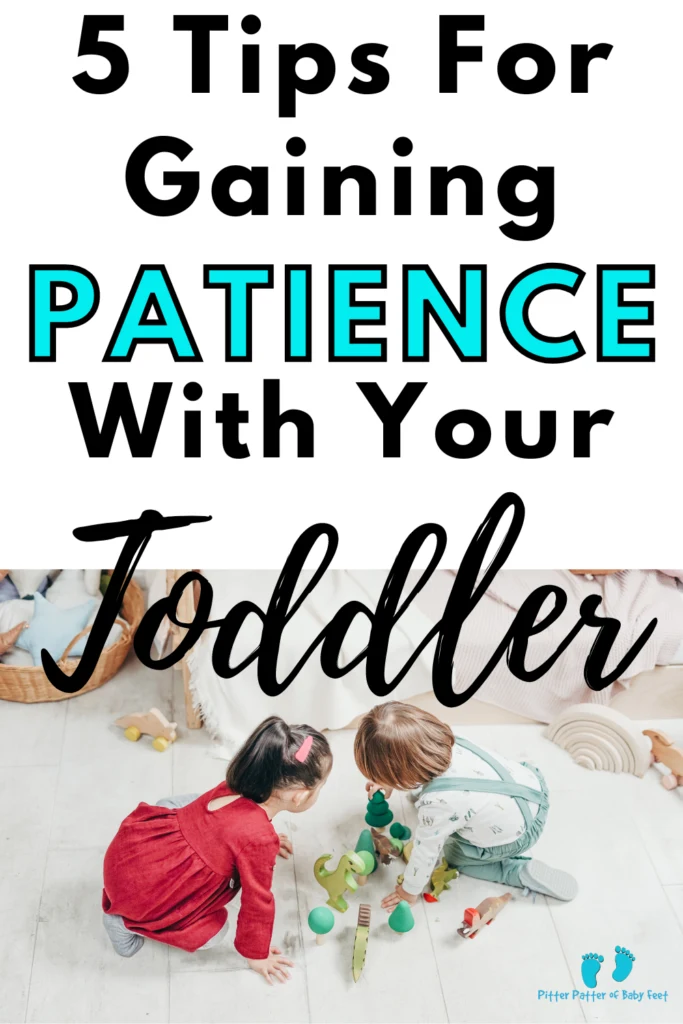
Young children. Are there any other things I should say? There are several possible interpretations of the word’s meaning.
Toddlers are prone to acting irrationally, having short fuse, and occasionally even being unkind.
They have the power to severely test a mother’s patience. And then there are other circumstances where they are just as appetizing as apple pie.
These tiny humans are in a stage where they are trying to grow up and become independent, but they still need you all the time.
Here are five strategies for keeping your cool and having patience with a toddler!
Disclosure: Bear in mind that some of the links in this post are affiliate links and if you click on them to make a purchase I will earn a commission. Keep in mind that I link these companies and their products because of their quality and not because of the commission I receive from your purchases. The decision is yours, and whether or not you decide to buy something is completely up to you.
Your child is having a full-blown tantrum and punching you the next thing you know.
Your precious tiny baby fell asleep in your arms and clung to you the very next second.
I know exactly what you’re going through because I am a toddler’s mommy.
Occasionally, I have fleeting concerns about the decision I made to become a parent.
But then my tiny toddler gives me that beautiful blue gaze, and I feel a surge of warmth come over me.
He had a one-hour-long rage tantrum because I wouldn’t let him get off the couch face first, but I quickly forget about it all.
Oh, the joys and ecstasies of motherhood!
I think we’ve all been there. Whether her child is far into adolescence or is still in the neonatal stage, every mother has been there.
Would you believe it, too?
Not a single mother who came before you has been damaged by this experience.
You can be pushed to your absolute limit by toddlers. Turning on every secret dial in your body that you had no idea existed.
Parenting a child who is still a toddler can provide some difficulties.
Particularly for you, mom. Do not fear! All you need is a lot of it. And I do mean a great deal of patience.
When we talk about patience, we imply the capacity to tolerate delay and/or difficulty without losing our cool or becoming irritated.
It can be really difficult to be patient when working with youngsters at times.
particularly if you are a stay-at-home mom raising your kids.
It never occurs to you to take a break from your home and recharge.
Something will have to give at some point, and most of the time it will be your patience.
In order to keep my sanity while coping with my one-year-old son, I have learned how to handle his everyday tantrums, newly discovered independence, and goofy antics.
My early development of tolerance was aided by my toddler’s experience.
How to Stay Patient When Dealing With A Toddler
1. Give up yelling
Every one of us has encountered at least one mother in our lifetime who seems to yell at her kids nonstop.
Regardless of what they do, her first reaction is to yell at them.
I promise you that there are moments when I act like an irate mother.
Some days are the worst because I have to deal with far too many episodes of vomiting and tantrums that resemble the scene from The Exorcist.
I have reached the end of my patience right now with my son. I speak louder to convince you of my point of view. Still, nothing has altered.
He still gets into rage outbursts now.
This is because shouting is an ineffective means of communication.
Showing him my anger is all I’ve managed to accomplish. This may cause him to become agitated and perplexed.
If a child is exposed to it enough, they could grow up thinking that yelling is normal and even acceptable in daily situations.
When I scream at my son, I’m teaching him that it’s okay to get angry at little things that happen in life.
That is not a sensible way to live. You may teach your child how to handle difficult situations by controlling your own emotions and without becoming upset and yelling at them.
Apart from yelling at them, what other choices are there?
Talk in a composed tone. A child can get your argument without you having to scream or cry at them. Kids are intelligent. They become knowledgeable really fast.
Think about presenting your case from their point of view if you want to win them over.
Directly address your child and explain to them why their behavior is inappropriate.
Never forget to maintain composure and speak in a measured tone.
If you can control your temper and maintain composure, your youngster will feel more at peace.
Related: Help! My Kid Won’t Sleep! 5 Bedtime Tips For A Better Night’s Sleep
2. Consider What Your Youngster Did Well Today
Suppose your child has just finished using every paintbrush in his set to create his most recent masterpiece on the wall.
Even when your child’s behavior is inappropriate, it’s vital to focus on all of the amazing things your child accomplished before this small incident.
Was it possible for him to brush his teeth without losing his cool?
Is his room neat because he picked up his toys on his own initiative rather than waiting to be asked?
Did he have an amazing nap?
I hope you understand where I’m headed with this. Think about the various ways you could express your gratitude to your child.
You may be confident that none of your kids are ever totally perverted.
They had to have slept at some point, surely? I’m kidding.
Youngsters are quick learners and already quite smart, but they are still figuring out who they are in the world.
When you find out your child has been painting on the walls, try not to get upset. Instead, try to stay composed.
Give yourself a moment to gather yourself before firmly telling your youngster that painting on walls is never permitted.
You should then give your child praise. Tell him or her something good that happened during your day together.
Even though your child may have given you a headache from the extra hours of cleaning time they required, you can always find something good to say about them.
Positive reinforcement not only promotes good behavior, but it also shifts your attention away from little annoyances and toward anything else.

3. Have Integrity
My toddler knows when his mother is starting to become a bit agitated.
A mother who choose to stay at home has a difficult life. You are not granted any breaks.
You don’t have the luxury of being able to unwind by leaving the house, getting in the car, and heading to the spa (without the kids).
A youngster that naps for a good length of time is a blessing in my book. Usually, those are the only times I get away from being a mother.
After a particularly difficult day with my son, I finally lost my patience and lost my cool.
You know that moment when you just could lose it and start sobbing uncontrollably or screaming at the top of your lungs?
Every single mother has probably been there at least once.
I really hope that I’m not alone, at the absolute least.
Since my patience is at its lowest point right now, I grab my son’s attention, meet his intense gaze, and sternly say, “Mommy is losing her patience.” Sometimes I’ll say something like, “You are really annoying mommy.”
I understand how harsh it could seem. That’s precisely the situation, but I’ve always thought it’s critical to be truthful and upfront with my son.
There will be three things that happen after I tell him the truth.
I want to start by saying that it feels good to be able to tell him how I really feel because it takes a weight off my shoulders.
Second, my son knows that things are not going well between us and that our relationship is suffering.
Thirdly, he gives me a hug and says he understands when I tell him I’m becoming impatient.
Of course, not every youngster will act in this way.
Mothers and their children, however, have an unseen relationship. His way of saying sorry is through the warm embrace he gives you.
I can tell he’s angry just by the way I look at him. His embrace is an attempt to patch things up between us.
I believe that no matter what happens, everything will work out because we still have the greatest love for one another.
Being truthful with your kids will give them time to get ready before you start screaming or, depending on the day, ball up and cry.
When you are honest with your children, they will be able to see the true you. Every mother is not perfect.
Every mother finally lashes out and loses it.
Related Articles: What To Do When You Feel You Might “Lose It” On Your Kids
The Lies I Told My Pre-Parenting Self
The Positive Of Having A Child With Autism
4. Put Yourself In Your Child’s Shoes
Most of us are prone to losing our childhood innocence as we become older.
Our life’s events are loaded with responsibilities. We view the scenario from the standpoint of an adult.
The only lenses through which we may understand and perceive any particular situation are adult ones. Children’s viewpoints on the world are incredibly distinct.
The next time your toddler has a tantrum, try to put yourself in his or her shoes and try to comprehend what they are going through.
-Where is this outburst of rage coming from?
-Consider yourself to be a tiny human. In the same circumstance, how would you respond?
Not too long ago, my family and I attended a choral concert. It started at around seven o’clock at night, which is when my son usually goes to bed.
My son and I didn’t even get through the first song together.
As he sobs hysterically in the entryway, I am mentally going over all the things that have bothered him.
I’m attempting, at least somewhat, to put myself in his shoes.
My son is going to a concert with a lot of people he doesn’t know, therefore he is staying up much later than usual.
Not only does he get nervous around new people, but he also finds it difficult to run, walk, or play when he wants to.
Trying to understand things from my son’s perspective helped me be patient with him in this specific situation.
Managing the social expectations that accompany caring for a child in a public place can be difficult for any mother.
In instances such as these, it is crucial to take into account both your adult feelings and the emotions your youngster is going through.
When interacting with a toddler, it can be beneficial to consider issues from your child’s point of view in order to avoid circumstances that could become difficult down the road.
5. Encourage Patience
Children are generally not very tolerant of most things. When a toddler experiences hunger, it is an immediate feeling.
There’s absolutely no waiting involved.
As a mother, you have two options: either you manage to establish a routine and begin food preparation, or you face the possibility of your child throwing a fit. Being patient is not what we are by nature.
Children must learn how to wait with patience. The majority of the time, those closest to them teach them important life lessons.
Teaching your child the virtue of patience and how to regulate their anger will help you as a mother to be a more patient person.
From events that happen in their daily life, your toddler may acquire the virtue of patience.
Refrain from always caving in to your child’s demands for immediate gratification.
Telling your child to wait patiently for what they beg for is not appropriate.
Certain products are not able to be supplied to them immediately.
Turn the time you spend reading into a lesson in patience.
If they read a longer book, a toddler will read it and turn the pages to reach the finish of the story.
Increase the duration of time the child spends listening to stories as they get older.
Teach your child the importance of sharing. Allowing your child to take turns playing with an object they both appreciate might be a simple way to teach them patience through sharing.
A child must be very patient when it comes to sharing.
A child might further explore the idea of patience by practicing taking turns.
Divide up your time, if possible. You could, for example, set a fifteen-minute timer.
Your youngster will have to give the toy to one of their siblings to play with when the timer goes off.
Children learn the value of patience gradually over time, as 15 minutes is a long time to wait for a toy to be returned.

Final Thoughts
It can be challenging to exercise patience when dealing with toddlers. Every day is unique in its own way.
There are simply days that are worse than others. Keep in mind that you should not react in anger even on the worst days, when your toddler pushes you to the very edge of your patience.
The feeling of anger only makes the situation even more difficult.
You don’t want yelling to be an acceptable style of communication, even if it can be difficult to refrain from raising your voice at times when you want to get your point through.
The tension that exists between you and your toddler can be eased by maintaining a calm voice.
Being a parent is all about having the strength to remain calm despite the chaos that surrounds you.
Find the good things that your child has done today and write them down (before the chaos).
There is a good chance that your toddler has impressed you with a million and one little things today that have gone undetected. Applaud the greatness that your child possesses.
When everything else fails, be honest. Warn your child that mommy is not feeling well and is about to go crazy because she is about to lose her mind.
When dealing with youngsters, honesty goes a very long way.
Your child will see that you are a real person with real imperfections, such as a lack of patience, as a result of this.
But try not to worry about it because there will be times when your child will lack patience just as much as you do.
Because of this, it is essential to try to understand the world from the perspective of your toddler.
The ability to look at a problematic circumstance from a different angle ultimately results in a more favorable outcome.
Keep in mind that you are the one who controls your feelings. Not your toddler.
You are the one who determines how the rest of the day will go, even if your toddler is testing your patience.
Instead of reacting in anger, focus on teaching your child patience through the various experiences that they will encounter throughout their life.
The more patience you show toward your child, the more patience your child will learn.
So go and follow these five tips for how to not lose your patience with a toddler!
Works Cited:

